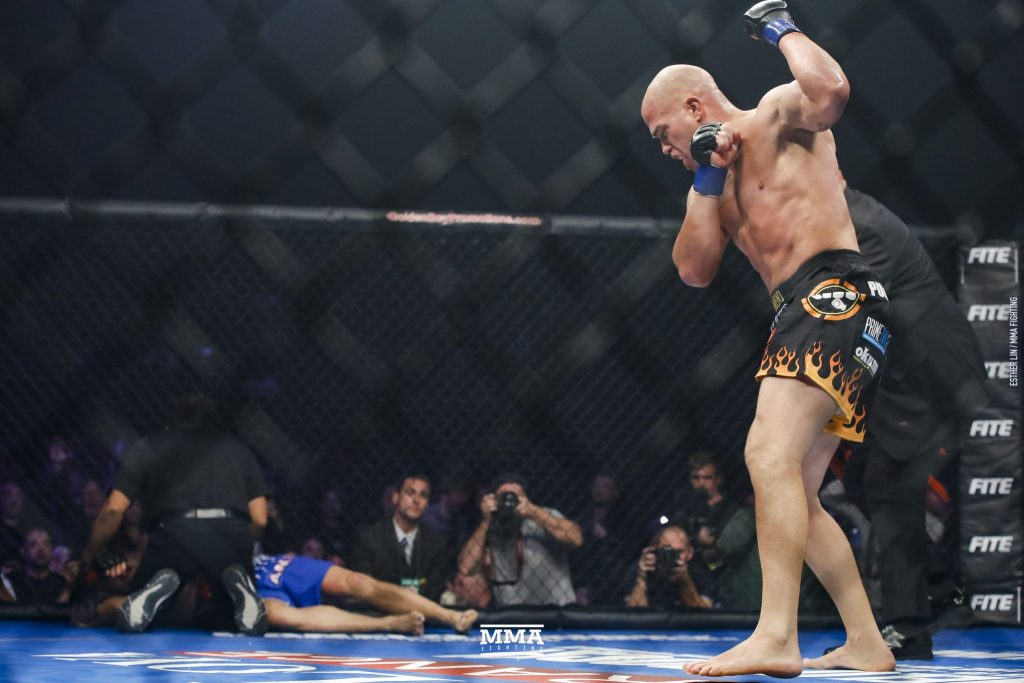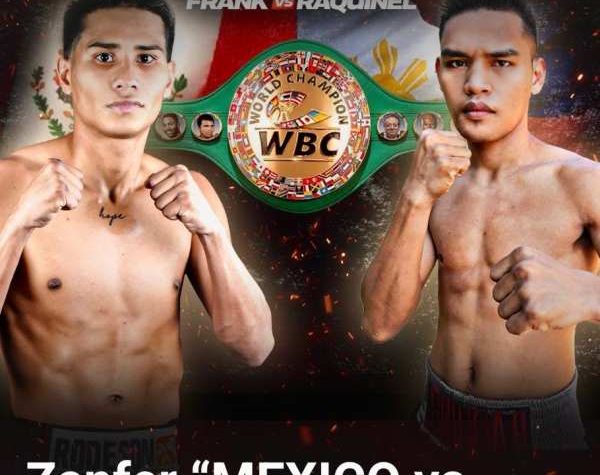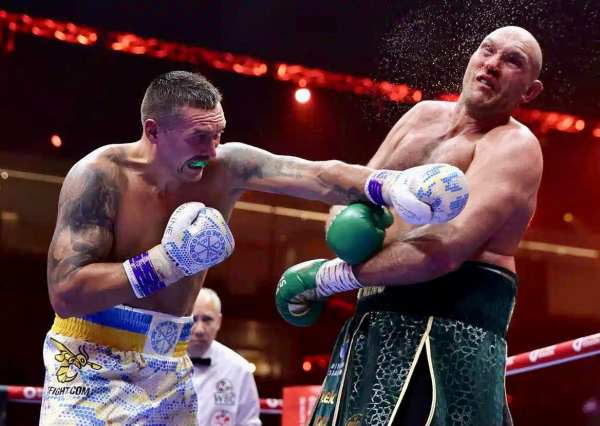
Realistically, there were very few scenarios that could’ve played out Saturday night that would feel good on Sunday morning. If Tito Ortiz had won a three-round decision over Chuck Liddell in that twilight trilogy fight, in all likelihood people would have been snoozing by the mid-second. If Liddell had knocked Ortiz out, we’d have heard him talking about how he’s back; the kind of idea that would scream for an intervention.
Worst case scenario — and also the most likely — was that Liddell would go out there and look as though he were fighting underwater with high-beam lights in his eyes. He would appear old, a husk of himself, and flash that haunted look when the final punch shut down his consciousness, yet again. He would crumble over his legs in a familiar way and face plant into the canvas, making the whole thing feel excessive, unnecessary and exploitative. He would confirm what we all knew eight years ago, and what Dana White tried to protect him against, and what his longtime coach John Hackleman wouldn’t abide by, and what Rich Franklin’s off-hand already explained, in gratuitous detail, when it was still flying.
That Liddell is shot. That he shouldn’t be fighting anymore. That it’s over.
Golden Boy’s foray into MMA was a set-up for some kind of morose outcome, it just boiled down to which one. Sadly it turned out to be the latter. “The Iceman” waited over eight years to have his delusions re-realized, and his last attempt for a happy ending to get trampled by his old rival. Ortiz knocked Chuck out, and then went into his gravedigger dance, burying the iconic Mohawk for good. Ortiz wanted it to be a redemption of sorts after losing to Liddell twice in the mid-aughts. He got it. Nothing about it felt right. Ortiz merely flushed out the last birds from the orchard. It was a shotgun burst, and the lonesome sound of departure.
The whole thing felt off from the beginning. Golden Boy’s Oscar De La Hoya didn’t particularly know who his principals were, yet he had it on good authority that they were old rivals and had names. He couldn’t have described why they were pioneers in MMA, nor why it might hurt to see them hack away at each other in their deep forties. He merely knew that if he brushed off some relics and set them up for presentation, he could put a price on it (in this case $39.99). What was he pedaling, if not nostalgia? If not simply the idea of Fire & Ice revisited, ready to bring resolution to a feud that began 14 years ago at the beginning of MMA’s boom period?
It was never anything but a shaky premise.
And yet, even as De La Hoya was mailing in his hype, he stumbled onto one philosophical truth during last Tuesday’s tragic press conference, a truth that virtually doubles as a loophole for exploitation. Nobody can tell a fighter when he’s done. Nobody can tell them when to quit. If Liddell was going to come back and fight at 48 years old, he was going to do it somewhere, for somebody. De La Hoya merely agreed with Liddell, and provided a cage. His defense for sticking a shopworn Liddell in there eight years after we saw the sad end was that he believes in fighter autonomy.
Which was more defense than Chuck had at the Forum. You could see right off the bat that the punches were coming out with fatal reluctance, incredibly slow and without menace. Worse, he looked wooden — complete stiff, with a spooked posture, bobbing from side to side like a man in a windstorm. The signals from brain to legs were a static disconnect. Color commentator Rashad Evans — who kicked off Liddell’s downfall by knocking him out at UFC 88 ten years ago — declared right off that Liddell shouldn’t be fighting. It wasn’t whether or not his chin could take a punch, it was that he wouldn’t be able to slip the punches. Could he get out of the way? The fight was immediately about self-preservation, the one thing that Liddell never learned.
The thing that made him a legend when he was at his very best.
It was immediately a watch-through-your-fingers affair, waiting for moment of detonation. Once Tito caught on, he lost all respect for Chuck’s once legendary firepower. He stalked ahead and put the leather on him. He tracked Chuck down on the fence, and clocked him with a right hand, flush on the button. That was it. Liddell was through. Up went the groans from anyone who saw it coming (which was just about everyone). Ortiz went into his grim celebration, and the California commissioners — who sanctioned the fight — tried to tell him that perhaps some discretion in this case was needed. Ortiz went about his business anyway, as Liddell drug his frame off the canvas and tried to find his stool.
Ortiz took a moment to pay his respects to Liddell in the post-fight interview, and to encourage him to keep fighting. That, too, hit the airwaves like a cartoon jaw hitting the ground. Ortiz hasn’t changed. And neither has Chuck from the last time we saw him in 2010. Saturday night confirmed what we knew. Denial as a premise for a comeback rarely works out, and a little ice on the trunks is not enough to preserve a legend. The only thing left to say after Golden Boy’s first MMA show is mercy.
Mercy, mercy, mercy.





More News
Liu Gang, Brico Santig Join Forces
Highland’s Double Impact: August 18 at Lumpinee
Balajadia, Atencio in Action in Thailand